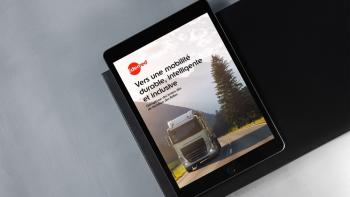One of the most complex transformations facing modern businesses is the management of corporate fleets. From decarbonisation and digitalisation to chipping away at the informal economy, Edenred’s unique insights chart a practical path forward for Europe and Latin America.
IRU member Edenred’s latest white paper takes stock of three factors shaping the sector: the push to decarbonise, the power of rapid digitalisation and automation, and the shortage of drivers.
We asked Diane Coliche, Edenred Mobility’s Chief Operating Officer, to give us a glimpse into the findings, focused on their key markets of Europe and Latin America.
What are the key challenges facing road transport?
The sector is facing three interconnected challenges: decarbonisation, digitalisation and driver shortage, as highlighted in our new global white paper, Green, Smart and Inclusive: A Deep Dive on Key Drivers for Corporate Fleets.
Road transport decarbonisation is a key priority. The entire transport sector, including all modes and private cars, accounts for about a fifth of global CO2 emissions. Fleet electrification is one of the solutions to support decarbonisation. However, the transition is quite complex for heavy-duty vehicles. They cover longer ranges and require more energy. Yet they must contend with limited charging infrastructure. In this context, alternative fuels also have a critical role to play.
Digitalisation and automation, driven by advancements in AI and telematics, are also evolving fast. Digitalisation is a key enabler for companies to assess their carbon footprint, increase operational efficiency and make informed decisions. On average, 65% of fleet managers surveyed by Edenred indicated that they need more and better data to improve their decision-making.
Finally, the shortage of drivers remains a significant challenge across Europe and Latin America, putting long-term workforce sustainability at risk. Road safety, driver training and benefits (e.g. medical care on the road) are key to avoiding the demonisation of the truck driving profession and recruiting more skilled drivers.
Addressing these challenges, the “three Ds”, will help future-proof corporate mobility.
Are there regional differences?
Absolutely. On the one hand, there is momentum behind electrification in the EU, supported by policy and a growing charging network. EU electric truck sales are projected to increase sixfold between 2025 and 2030. Electric trucks will make up 37% of all new truck sales and represent 7% of the total truck fleet by 2030.
There is no shortage of willpower on the side of companies to electrify their fleets. According to our survey of more than 750 fleet managers in Europe, most companies are keen to increase their share of electric and plug-in hybrid vehicles. In fact, companies may be the most underestimated potential driver of the urgently needed shift to sustainable transport. Their large share in vehicle sales as well as the high mileage of their vehicles provide strong leverage for change.
However, many companies are still lagging behind on vehicle electrification compared to private users: broader fleet electrification is mainly limited by the maturity of electric vehicle infrastructure and its associated financial impact. In the above-mentioned survey, when asked “what could help you speed up your decision to electrify your fleet”, companies that are not yet engaged in electrification listed financial (50%) and technological factors (26%) as the main barriers to be lifted.
The approach to decarbonisation is more energy diverse in Latin America. Brazil – where Edenred Mobility is a leading player in fleet and mobility solutions – has pioneered the use of bioethanol. It is currently the world’s second-largest producer of this alternative fuel. Over 85% of all light vehicles currently sold in Brazil use flex-fuel technology.
How is digitalisation helping?
Digitalisation – powered by AI, cloud technology and telematics – is transforming the transport ecosystem. These technologies are true enablers of smarter, cleaner and more efficient logistics.
One major opportunity lies in predictive maintenance, which is significant for fleet management. As we explain in the white paper, data-based predictive maintenance can lower fleet maintenance costs by 15% – mainly by avoiding downtime and towing – and boost fleet availability by 10-15%.
In Europe, digitalisation is helping operators comply more easily with new CO₂-based truck tolling systems. With access to smart tools such as CO₂ emission class calculators, they can manage tolls more efficiently while aligning with broader sustainable mobility goals.

What about the social dimension of road transport?
Road transport is mostly about humans behind a steering wheel. They are the ones whose wages and expense coverage are undermined by the informal economy and unnecessary administrative burden. The acceleration of digitalisation with one-stop-shop digital platforms can help eliminate paperwork and improve drivers’ working conditions.
Besides, given the current shortage of drivers, it is more vital than ever to make the profession more attractive to young people and women (while retaining experienced drivers). This can be achieved by improving working conditions and offering benefits such as healthcare access and safer rest environments.
At Edenred, the global leader in benefits and engagement solutions, we speak from experience, and we promote partnerships contributing to better hiring and retention.
For example, we have partnered with Brazilian healthcare services platform VidaClass to meet drivers' needs with a network of over 25,000 health professionals. In Europe, we collaborate with Travis, enabling seamless transactions at over 600 truck parking locations.
We look forward to building on these relationships and shaping the corporate mobility of the future.
